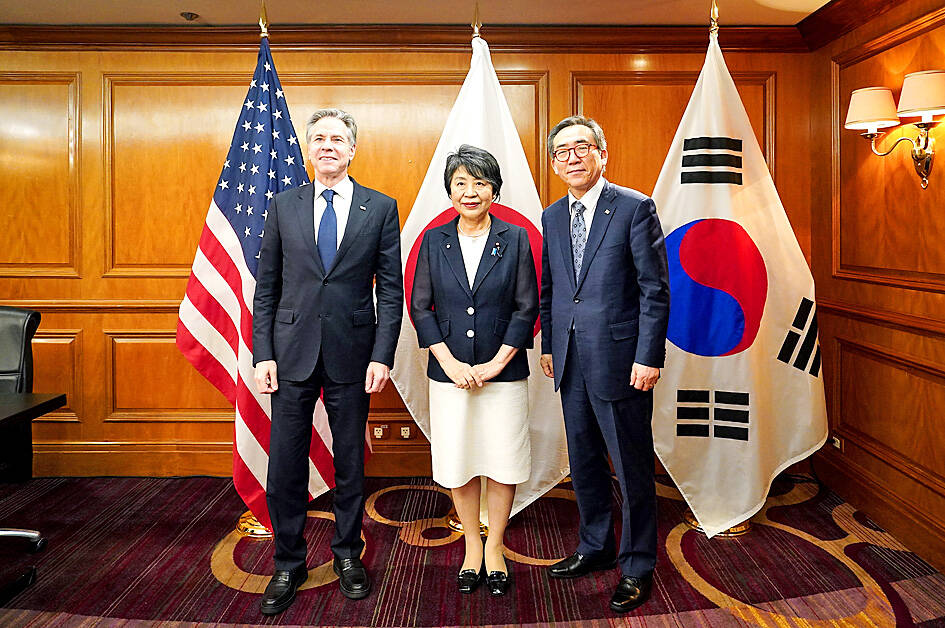The Ministry of Foreign Affairs yesterday expressed gratitude to the US, Japan and South Korea for their continuous attention to issues across the Taiwan Strait, and their efforts to maintain cross-strait peace and stability.
US Secretary of State Antony Blinken, Japanese Minister of Foreign Affairs Yoko Kamikawa and South Korean Minister of Foreign Affairs Cho Tae-yul “discussed efforts to maintain peace and stability across the Taiwan Strait” on the sidelines of the G20 Foreign Ministers Meeting in Rio de Janeiro, Brazil, on Thursday, US Department of State spokesman Mathew Miller said.
The three leaders also exchanged views on “ongoing and future efforts to support one another’s respective Indo-Pacific strategies,” as well as North Korea’s provocative behaviors and the conflict in Gaza during the trilateral meeting, Miller said.

Photo: EPA-EFE / South Korean Ministry of Foreign Affairs
In Taipei, the ministry welcomed the discussion by the three heads of foreign affairs based on the collective stance their leaders adopted at a historic summit at Camp David, Maryland, in August last year.
US President Joe Biden, Japanese Prime Minister Fumio Kishida and South Korean President Yoon Suk-yeol in a post-summit statement reaffirmed “the importance of peace and stability across the Taiwan Strait as an indispensable element of security and prosperity in the international community,” and called for a peaceful resolution of cross-strait issues.
China’s provocative actions intended to undermine the “status quo” across the Taiwan Strait, such as its military intimidation against Taiwan and a unilateral change to flight route M503, have posed severe challenges to regional security and aroused great concern from the international community, the ministry said.
Like-minded nations have reiterated the importance of cross-strait peace and stability during leaders’ summits and multilateral meetings, showing that a strong consensus exists on the issue, it said.
As a responsible member of the international community, Taiwan is to continue working with international partners to safeguard the rules-based international order, and promote regional peace, stability and prosperity, it added.
Separately, President Tsai Ing-wen (蔡英文) yesterday thanked the Japanese government for underlining the importance of cross-strait peace and stability.
Tsai made the remarks during her meeting with Sasakawa Peace Foundation executive director Nobukatsu Kanehara at the Presidential Office in Taipei.
Tsai thanked Kanehara, a senior diplomat, for his support and concern about relations between Taiwan and Japan, and for providing insights on Taiwanese and Japanese affairs in books and at forums.
She also expressed gratitude to the Japanese government for reaffirming the importance of peace and stability across the Taiwan Strait on many occasions.
Taiwan and Japan have always been good friends that support each other, such as overcoming the challenges of the COVID-19 pandemic, and signing agreements to facilitate economic, industrial and cultural exchanges, she said.
Tsai said she hoped to see the two sides continue to expand their cooperation in various fields, and to jointly safeguard democracy and freedom to create a free and open Indo-Pacific region.

SECURITY: As China is ‘reshaping’ Hong Kong’s population, Taiwan must raise the eligibility threshold for applications from Hong Kongers, Chiu Chui-cheng said When Hong Kong and Macau citizens apply for residency in Taiwan, it would be under a new category that includes a “national security observation period,” Mainland Affairs Council (MAC) Minister Chiu Chui-cheng (邱垂正) said yesterday. President William Lai (賴清德) on March 13 announced 17 strategies to counter China’s aggression toward Taiwan, including incorporating national security considerations into the review process for residency applications from Hong Kong and Macau citizens. The situation in Hong Kong is constantly changing, Chiu said to media yesterday on the sidelines of the Taipei Technology Run hosted by the Taipei Neihu Technology Park Development Association. With

A US Marine Corps regiment equipped with Naval Strike Missiles (NSM) is set to participate in the upcoming Balikatan 25 exercise in the Luzon Strait, marking the system’s first-ever deployment in the Philippines. US and Philippine officials have separately confirmed that the Navy Marine Expeditionary Ship Interdiction System (NMESIS) — the mobile launch platform for the Naval Strike Missile — would take part in the joint exercise. The missiles are being deployed to “a strategic first island chain chokepoint” in the waters between Taiwan proper and the Philippines, US-based Naval News reported. “The Luzon Strait and Bashi Channel represent a critical access

‘FORM OF PROTEST’: The German Institute Taipei said it was ‘shocked’ to see Nazi symbolism used in connection with political aims as it condemned the incident Sung Chien-liang (宋建樑), who led efforts to recall Democratic Progressive Party (DPP) Legislator Lee Kun-cheng (李坤城), was released on bail of NT$80,000 yesterday amid an outcry over a Nazi armband he wore to questioning the night before. Sung arrived at the New Taipei City District Prosecutors’ Office for questioning in a recall petition forgery case on Tuesday night wearing a red armband bearing a swastika, carrying a copy of Adolf Hitler’s Mein Kampf and giving a Nazi salute. Sung left the building at 1:15am without the armband and apparently covering the book with a coat. This is a serious international scandal and Chinese

COUNTERINTELLIGENCE TRAINING: The ministry said 87.5 percent of the apprehended Chinese agents were reported by service members they tried to lure into becoming spies Taiwanese organized crime, illegal money lenders, temples and civic groups are complicit in Beijing’s infiltration of the armed forces, the Ministry of National Defense (MND) said in a report yesterday. Retired service members who had been turned to Beijing’s cause mainly relied on those channels to infiltrate the Taiwanese military, according to the report to be submitted to lawmakers ahead of tomorrow’s hearing on Chinese espionage in the military. Chinese intelligence typically used blackmail, Internet-based communications, bribery or debts to loan sharks to leverage active service personnel to do its bidding, it said. China’s main goals are to collect intelligence, and develop a